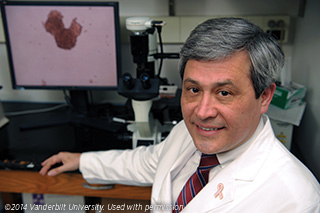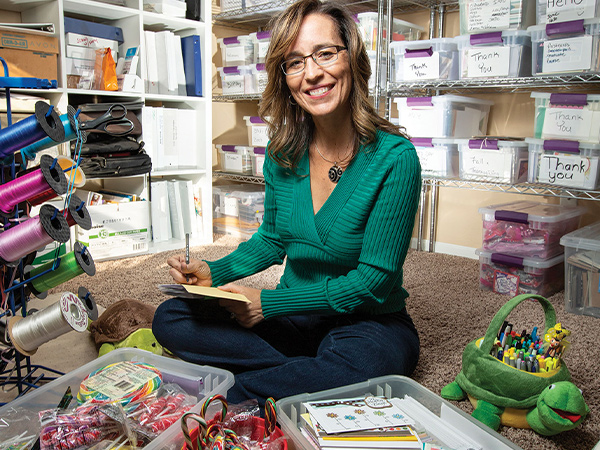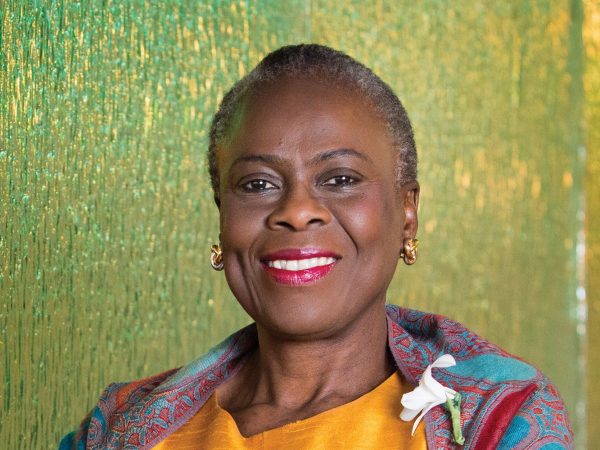Dr. Carlos L. Arteaga: Working Together to Eradicate Cancer
From integrating clinical cancer care with biomedical research to advocating for early-career cancer researchers, AACR President Dr. Carlos L. Arteaga’s single goal is to improve patient outcomes.
An internationally renowned expert in clinical and translational research, Carlos L. Arteaga, MD, professor of medicine and cancer biology at Vanderbilt University in Nashville, Tenn., and the 2014-15 President of the American Association for Cancer Research (AACR), is committed to improving outcomes for all patients confronting cancer.
As a physician-scientist, Dr. Arteaga has dedicated his career to transforming the lives of breast cancer patients by seeking to exploit the molecular abnormalities that underpin the disease. At the same time, as a member and leader of the AACR, Dr. Arteaga has long championed the organization’s efforts to catalyze advances across the spectrum of cancer research, halt and reverse declines in federal research funding, and better support early-career investigators.
“Addressing these issues is vital if we are to keep up the spectacular pace of progress against cancer that we have seen in recent decades,” says Dr. Arteaga.
Changing Treatment Standards With Personalized Medicine
Personalized cancer medicines are transforming the standard of care for patients with a number of different types of cancer, including breast cancer. What this means, is that patients with a given cancer type are not all treated with the same medicines; rather the molecular makeup of each patient’s tumor is used to determine the best treatment choice.
Dr. Arteaga is using a number of different approaches to deliver the promise of personalized cancer medicine to breast cancer patients, in particular patients with triple-negative breast cancer – a form of the disease that disproportionately impacts younger women and African Americans – and patients who have become resistant to currently available treatments.
In the U.S., a patient’s breast tumor is tested for three markers – the estrogen receptor (ER), the progesterone receptor (PR), and human epidermal growth factor 2 (HER2). About two out of every three breast cancers test positive for the hormone receptors ER and/or PR; patients with these cancers typically receive antihormone treatments. One in every five breast cancers tests positive for HER2, and there are currently four HER2-targeted personalized cancer medicines for physicians to choose from when deciding the best strategy to treat a patient with these cancers.
One in every five breast cancers tests negative for all three markers. Patients with these cancers – triple-negative breast cancers – currently have no personalized cancer medicines available to them and typically receive traditional chemotherapy. Treatment options are also limited for patients with any form of breast cancer who relapse because their breast tumors stop responding to the medicines they are being treated with; that is, their breast tumors become drug resistant.
Transforming Lives Through Clinical Trials

As a principal investigator for the Stand Up To Cancer (SU2C) ‘Targeting the PI3K Pathway in Women’s Cancers’ Dream Team, Dr. Arteaga is helping the team test a number of investigational personalized breast cancer medicines.
In one early stage clinical trial recently reported in the Journal of Clinical Oncology, Dr. Arteaga and his colleagues found that an investigational personalized breast cancer medicine called buparlisib, or BKM120, was safe and showed signs of clinical benefit among women with metastatic ER-positive breast cancer that had become resistant to antihormone treatment. Buparlisib is now being tested in a number of large phase III clinical trials.
Buparlisib targets the PI3K pathway. Dr. Arteaga’s preclinical work showing that signaling along the PI3K pathway helps ER-positive breast cancers become resistant to antihormone treatments, provided key insight that led to the numerous clinical trials. Those trials have tested and are continuing to test PI3K-targeted drugs as a treatment for women with ER-positive breast cancer resistant to antihormone treatments.
Working to Overcome Breast Cancer Drug Resistance
Another way that Dr. Arteaga is hoping to change the face of breast cancer treatment is to use cutting-edge genomic technology, which allows him to ‘read’ all of the units of the genome, to understand why some breast cancer cells are resistant to therapy.
In a study published recently in Cancer Discovery, a journal of the American Association for Cancer Research, Dr. Arteaga and his colleagues identified a number of ways in which triple-negative breast cancers were resistant to pre-surgery chemotherapy, a type of treatment often called neoadjuvant chemotherapy. Moreover, there are investigational personalized cancer medicines that target many of the molecular abnormalities the researchers found to be fueling resistance.
Dr. Arteaga and his colleagues explain that these results suggest that molecular analysis of triple-negative breast cancers resistant to neoadjuvant chemotherapy could help direct patients to clinical trials with personalized breast cancer medicines that they may benefit from.
Staying Focused on Finding Cures Together
Dr. Arteaga recognizes that while we are making tremendous strides against cancer, there are significant challenges to sustaining the pace of progress. Foremost is the crisis in funding, with the effects of declining federal research support hitting early-career researchers particularly hard.
“Many young individuals who would be tremendous cancer investigators with good ideas are leaving cancer research or not joining the field because of the crisis in federal research funding,” he says. “We are doing very poorly in the retention and training of young investigators. We need to do more, and I am committed to working vigorously to develop new initiatives to recruit and retain early-career investigators in the field of cancer research.”
During his time as AACR President, Dr. Arteaga has been focused on providing opportunities and support for those early-career researchers.
“In the future, I would like to see an even stronger alignment of patients, advocates, and academicians working together,” Dr. Arteaga says. “I think the public is going to make a big difference in how to solve this funding crisis.”
Despite the challenges, he remains optimistic about the future of cancer research and the broader efforts to find innovative methods to prevent, treat, and, ultimately, cure cancer.
“Currently in the United States, the majority of patients with cancer are cured of their disease,” he says. “There are, however, still too many patients dying from cancer, and to them we owe our commitment to work tirelessly to find cures for their disease.”




